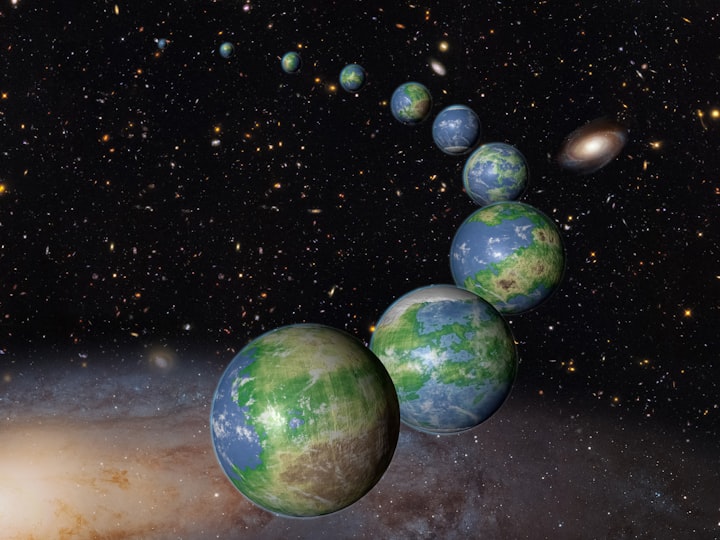
The universe is a complex, mysterious, vast, and often intimidating place to explore both physically and academically. There are so many different opinions and views on how it came to existence, how old (or young) it is, if it has a beginning or an end, if we should further explore it or if funds and resources are better spent elsewhere, and if there is life somewhere other than on planet Earth. Speaking of planets, there are specific qualifications to classify the many masses in space… There are planets, moons, stars, and asteroids amongst other less documented masses and orbiting matter. As scientific as the study of space is, we still cannot decide on certain things or prove beyond a doubt some of the answers we think we have. However, one such dilemma that intrigues me I wish to explore, research and explain to you in order to prove, scientifically, that the result I discover is factual. Beginning this exploration, I do not have any preconceived beliefs on what I perceive to be true and my only goal is to let science and the researched knowledge of others who are more qualified than myself to lead me to a conclusion of scientific fact. Welcome to my quest to discover: What exactly IS Pluto?
Pluto was first discovered February 18, 1930 by astronomer Clyde W. Tombaugh in Flagstaff, Arizona at the Lowell Observatory. Percival Lowell was the first person to predict the existence of a ninth planet due to wobbles in the orbits of Uranus and Neptune. However, Pluto was not publicly announced until March 13, 1930 after many calculations and collaboration with several other astronomers. (History.com)
In 2005, Eris was discovered in the scattered disc and being that it was 27 percent larger than Pluto, the International Astronomical Union (IAU) was forced to officially define the criteria for a full-sized planet. They determined that the three necessary criterion are as follows:
- It is in orbit around the sun
- It has sufficient mass to assume hydrostatic equilibrium
- It has “cleared the neighborhood” around its orbit. This means that it must be the largest gravitational force in its orbit. (Library Of Congress)
Pluto does not meet the third criteria to be considered a planet because of Eris which is larger than Pluto) being within Pluto’s orbit as well as Pluto crossing into Neptune’s orbit which overpowers the gravitational pull of Pluto. Thus, poor Pluto, after seventy-six years of being the ninth planet in our solar system, it was determined to be a “dwarf planet” instead. Let it be noted that nothing about Pluto changed in those seven-and-a-half decades, instead our definition changed and therefore stripped Pluto of its “planet-hood.”
One of the comforting things about science is that when new data presents itself that challenges previous beliefs, everything is reexamined with a fine-toothed comb in the form of extensive research by brilliant minds collaborating to discover the facts possibly overlooked. Philip Metzger with University of Central Florida is one of these brilliant scientists who is challenging the classification of Pluto as only a “dwarf planet.” After extensive study of the past two hundred years of scientific literature Metzger only found one publication—from 1802—that used the clearing-orbit requirement to classify planets and said publication has since been proven inaccurate. Metzger further claims that Pluto should be considered for planet classification again because he says due to the inaccuracy of the previous criteria the definition of a planet should be changed and instead based on its intrinsic properties, rather than ones that can change, such as the dynamics of a planet's orbit... Dynamics are not constant. They are constantly changing so they are not the fundamental description of a body. They are just the occupation of a body at a current era. (University of Central Florida)
Furthermore, though Pluto has had the reputation for being cold, distant and inhabitable, it wasn’t until 2016 that a spacecraft of any kind had passed by the mysterious dwarf planet. When early downloads from the New Horizons’ Flyby began, though in the beginning stages of inventory and modeling of the data, there is evidence that Pluto may actually have the components needed for life! What the data showed was various pre-biological processes below Pluto’s surface, complex layers of organic haze, water ice mountains formed from some unknown geological process, liquid water ocean under the surface, as well as the appearance of organic matter and organism on the surface of Pluto. Michael Summers, a planetary scientist on the New Horizons team who specializes in the structure and evolution of planetary atmospheres says, “The connection with astrobiology is immediate—it’s right there in front of your face. You see organic materials, water and energy… These are the things you need for life.” (Howell)
So, looking at what we know about the scientific method, there is no way to uphold the credibility of science without further investigation of Pluto and its status as a planet vs. a dwarf planet. As stated by Jeffrey A. Lee in The Scientific Endeavor, two of the core attributes and consistent practices of science are that science convinces by appeal to evidence, by arguments based on logic and/or mathematical reasoning and that science progresses and changes with the new evidence it is provided (Coker).
Just like when the discovery of Eris and the reclassification of what was considered a planet determined after 76 years that Pluto was NOT a planet, with more data as of recent showing that Pluto is much more sophisticated than originally proposed it should also be studied and reinstated as a planet in our solar system once again.
As for logical and mathematical evidence, I’m sure there will be more detailed data discovered from the 2016 New Horizons’ Flyby as it is modeled. However, even the basic information we have been provided thus far with the evidence of organics, water, and energy, I think it is safe to say that at the very least there is enough contradictory evidence AGAINST Pluto being considered a dwarf planet, and therefore as more data is retrieved, my science-tempered prediction is that Pluto will soon be reclassified as a full-sized planet.
What does this mean for us, though? Besides our children growing up with nine planets to learn the names of, is there a long term expectation of goal of the reclassification of Pluto?
Well, as our space travel gets more sophisticated and the scientific method leads us in new studies and exploration of planets such as Mars, Pluto and the surrounding moons of the Kuiper Belt it is clear that Earth’s moon isn’t the only place we should be studying. For years, Mars has been the object of observation in hopes of finding life; however, according to Metzger, Pluto is more dynamic and alive than Mars and has more complex geology as well… only being surpassed by Earth (University of Central Florida). Therefore, by reclassifying Pluto as a planet, there would be greater hopes of getting funding and resources to further investigate its components and possibly life!
Look out, Mars! Pluto may be stealing the limelight and popularity of astronomers and scientists around the world and we will be pushing the limits of our knowledge with the beacon of guidance: SCIENCE. I expect to see space exploration to become more popular in the next few decades, similar to when we were competing with the rest of the world for the claim on the moon.
This is a very exciting milestone and though some may wonder “What does it matter if there’s eight planets or nine?” or “Who cares if there’s life on other planets…” The fact is, we as human beings are seekers of knowledge and understanding and as our realms of influence and study are continuously expanding, we push to go further, to know more, to experience more, and hope to bring the rest of the world along for the ride.
So perhaps the scientific importance of space exploration and the classification of Pluto may not be apparent to some less enthusiastic science nuts, but even those more drawn to pseudoscience can appreciate the evolution of the human nature and our need for the connection to something bigger than ourselves.
The universe and both the mysteries as well as the predictability of science can be that “something bigger” for many… even the ones who wouldn’t jump for joy at the thought of reading an abstract on “Enhanced Microbial Survivability in Subzero Brines.” (Heinz)
For me, I have never been particularly interested in space travel, planets, astronomy, or anything related to the Universe outside of our Stratosphere. However, I am exceedingly invested and intrigued my science as a whole and the process it uses to find truth and patterns in our world and beyond. The thought that Pluto was “predicted” to exist before it was ever seen by a human is extraordinary to me. Though there is a huge difference between Astrology and Theology, I cannot overlook that where data ends, and knowledge has taken scientists as far as it can… They believe in something as large as another planet without seeing it and that, my friend, takes faith. Faith in science, in the predictability of the universe, in the reliability of our own formulas and abilities… so Pluto may have life. It may become reclassified… it may not. However the thing that draws us to know the answers to big questions like these and drive us toward truth is more than simply recognition, fortune and fame, its innate need for knowledge and understanding.
“It’s evolve or die, really, you have to evolve, you have to move on otherwise it just becomes stagnant.” – Craig Charles
This simple quote sums everything up… science, knowledge, human belief systems, everything in the universe. We as scientific minds must put our personal expectations aside and any data or information (and our own pride) that has been proven false and follow scientific truth. As I’ve done this throughout the research into Pluto, I believe 100 percent that Pluto is a Planet—not a dwarf planet—but a full sized named, influential planet. Testing the scientific method for myself in this journey of exploration has been enlightening and I honestly know that my opinion will not change… unless of course there is scientific evidence against it.
Works Cited
Coker, Rory. Science and Pseudoscience . 09 01 2008. 18 11 2018. <https://physics.weber.edu/carroll/honors/pseudoscience.htm>.
Heinz, Jacob. "Enhanced Microbial Survivability in Subzero Brines." Astrobiology 18.9 (2018). Article . 18 11 2018.
History.com, Editors. Pluto Discovered. 03 03 2010. Article. 18 11 2018. <https://www.history.com/this-day-in-history/pluto-discovered>.
Howell, Elizabeth. Does Pluto Have the Ingredients for Life?: New Horizons' Data Points to Organics, Water and Energy. 28 02 2017. 18 11 2018. <https://astrobiology.nasa.gov/news/does-pluto-have-the-ingredients-for-life/>.
Library Of Congress. Why Is Pluto No Longer A Planet? 31 07 2017. Reference . 18 11 2018.
University of Central Florida. New research suggest Pluto should be reclassified as a planet. 07 09 2018. 18 11 2018. <https://phys.org/news/2018-09-pluto-reclassified-planet.html>.
About the Creator
Meg Sarai
I’m a wife, mom, student, dancer, youth leader and a survivor of anorexia, attemped suicide, and trauma. I am passionate about using my writing to encourage and inspire others to travel through the struggles of today with hope for tomorrow.






Comments
There are no comments for this story
Be the first to respond and start the conversation.